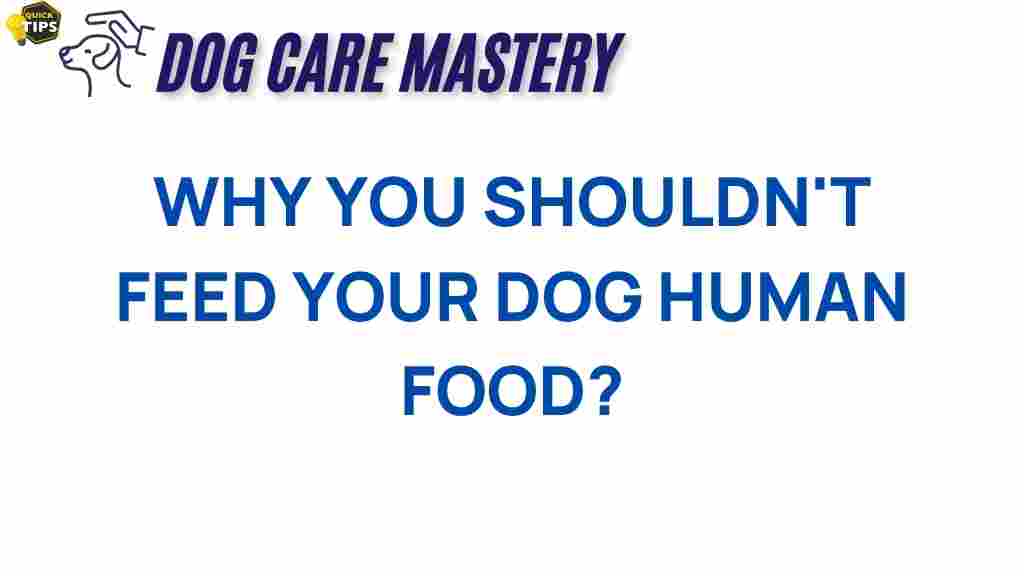The Hidden Dangers of Feeding Your Dog Human Food: Understanding Dog Health
As a loving pet owner, it’s natural to want to share your meals with your furry friend. However, the choices we make regarding our dog’s diet can have serious implications for their overall dog health. While some human foods are safe and even beneficial for dogs, many can pose significant risks. In this article, we will explore the hidden dangers of feeding your dog human food, how to identify safe options, and tips for maintaining optimal dog health.
Understanding the Risks
Feeding dogs human food can lead to a variety of health issues. Here are some of the primary concerns:
- Obesity: Many human foods are high in calories and fat. Regularly feeding your dog table scraps can contribute to obesity, which is linked to several health problems, including diabetes and joint issues.
- Digestive Problems: Dogs have different digestive systems than humans. Foods that are safe for us can cause stomach upset, diarrhea, or vomiting in dogs.
- Toxic Foods: Some human foods are toxic to dogs. Common examples include chocolate, grapes, onions, and garlic. These can cause serious health issues, including liver failure and kidney damage.
- Unbalanced Diet: Dogs require a balanced diet tailored to their specific needs. Feeding them human food can lead to nutritional imbalances, which can affect their long-term health.
Identifying Safe Human Foods for Dogs
While it’s essential to be cautious, there are some human foods that can be safely included in your dog’s diet. Here are some options:
- Lean Meats: Cooked chicken, turkey, or lean beef can be a great source of protein for your dog, as long as they are unseasoned and without bones.
- Fruits: Many dogs enjoy fruits like apples, blueberries, and bananas. These can provide vitamins and antioxidants but should be given in moderation.
- Vegetables: Carrots, green beans, and sweet potatoes are healthy choices that can be offered as treats.
- Rice and Pasta: Plain, cooked rice or pasta can be digestive aids, especially for dogs with upset stomachs.
How to Safely Introduce Human Food to Your Dog
Introducing human food to your dog’s diet should be done carefully. Follow these steps to ensure you are doing it safely:
- Consult Your Veterinarian: Before making any changes to your dog’s diet, it’s crucial to consult with your veterinarian. They can provide guidance tailored to your dog’s specific health needs.
- Start Slowly: Introduce new foods gradually. Start with small amounts to see how your dog reacts.
- Monitor for Reactions: Keep an eye on your dog for any signs of allergies or digestive issues after introducing new foods.
- Avoid Harmful Foods: Always be aware of which foods are toxic to dogs and avoid them completely.
Common Signs of Dietary Issues
If you suspect that your dog may be experiencing dietary issues due to human food, look out for the following signs:
- Vomiting or diarrhea
- Excessive gas or bloating
- Changes in appetite
- Fatigue or lethargy
- Skin irritations or allergic reactions
Troubleshooting Dietary Problems
If your dog shows any of the signs listed above, it’s essential to take action quickly:
- Stop Feeding Human Food: Immediately discontinue any human food you’re giving them.
- Contact Your Veterinarian: If symptoms persist, reach out to your veterinarian for advice and potential treatment.
- Provide Plenty of Water: Ensure your dog remains hydrated, especially if they are experiencing diarrhea or vomiting.
- Consider a Specialized Diet: If your dog has ongoing dietary issues, your veterinarian may recommend a specialized diet for their dog health.
Conclusion
Feeding your dog human food can seem like an act of love, but it can also lead to hidden dangers that can adversely affect their dog health. While some human foods are safe and even beneficial, others can be toxic or cause long-term health issues. Always consult with your veterinarian before making dietary changes and prioritize a balanced diet specifically designed for dogs.
For more information on maintaining your dog’s health, consider visiting this resource. Remember, your dog’s health is in your hands—make informed choices that keep them happy and healthy!
For further reading on dog nutrition, check out our article on the best diets for dogs.
This article is in the category Health and created by dogcaremastery Team
